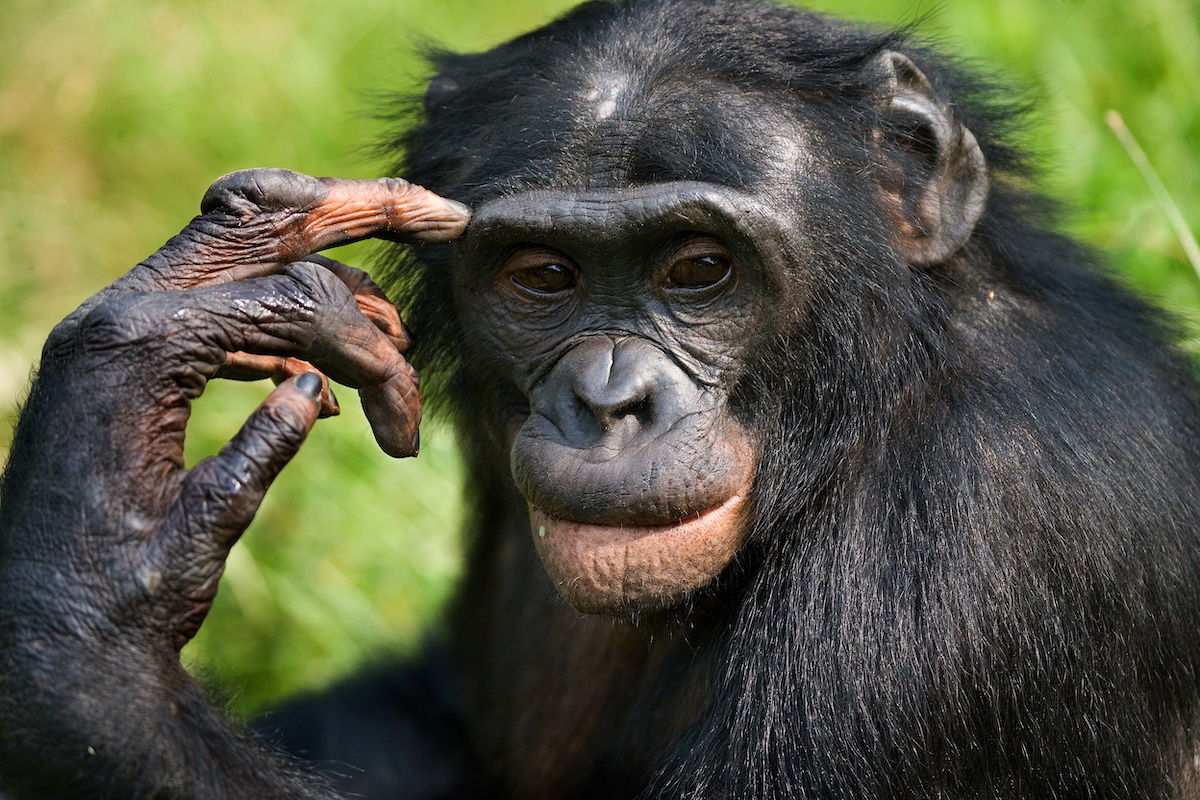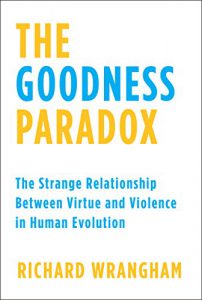Top Stories
The Goodness Paradox—A Review
Biologists have lately awoken to the news that their science makes them heretics in the postmodern imperium, and guilty of retailing the ideas most heretical to the progressive, constructivist, utopian-egalitarian worldview.

A review of The Goodness Paradox: The Strange Relationship between Virtue and Violence in Human Evolution by Richard Wrangham (Pantheon, 2019) 400 pages.
To future historians, it may seem strange that science in the early twenty-first century once again fell afoul of dogma. This time it issued, not from the pulpit, but from the university lectern. Today, prevailing intellectual doctrines hold that reality is a social construct, and their adherents do not take kindly to biologists reminding us that nature is comprised of objective facts. Biologists have lately awoken to the news that their science makes them heretics in the postmodern imperium, and guilty of retailing the ideas most heretical to the progressive, constructivist, utopian-egalitarian worldview.
Progressives were the natural friends of science when it overturned the altars of biblical certainty, and they continue to invoke its authority in debates about global warming and environmental degradation. However, when it comes to understanding the human animal or, say, the heritability of character traits like intelligence, or the fact that nothing can be had for nothing and that choices carry hidden costs, they are considerably less sanguine. It is not a coincidence that it has been evolutionary scientists, rather than their humanist cousins, who have felt the ire of radical progressivism. The professors who have faced opprobrium for expressing the wrong views are nearly all scientists (Charles Murray, Bret Weinstein, Sam Harris, Steven Pinker, Jordan Peterson, among the more notorious), and not one is a postmodern theorist.

The threat of excommunication no doubt weighs heavily on evolutionary anthropologists such as Richard Wrangham, who—as a good evolutionary scientist must—relays facts that are inconsiderate of ideology. In his latest book, The Goodness Paradox: The Strange Relationship between Virtue and Violence in Human Evolution, he recalls being accused of “political bias” for postulating that murder among chimpanzees was a beneficial adaptation (as if it were hard to imagine that eliminating a group of hostile competitors might benefit one’s offspring). “Evolutionary analysis,” he writes, “is fraught with the potential for emotionally and politically sensitive response.”
Into a minefield of provocative ideas Wrangham certainly treads—ideas such as the genetic determination of temperament, behavior, and gender, and the natural selection for adaptive traits that include hierarchy, authority, warfare, the universal subordination of females, in-group bias (i.e., bigotry), and the pleasure in killing strangers (the Romans thought this pretty obvious). Nor, he reminds us, should morality be understood as altruism, empathy, and loving-kindness, but rather as an apparatus of right and wrong designed to enforce social cohesion. In other words, nature is a school of hard knocks that knows nothing of diversity, equity, and inclusion quotas, and the successful graduates are those species—our own among them—that ran the gauntlet. The meek, one fears, have not inherited the earth.
Or have they? The first three-quarters of Richard Wrangham’s book will be familiar terrain to readers of Steven Pinker, especially The Better Angels of Our Nature: How Violence Has Declined. These pages certainly go a long way towards easing the suspicion of “political bias” (say, the unwitting prudential conservatism) of evolutionary science. Wrangham introduces the reader to two evolutionary actors: reactive and proactive aggression. Reactive aggression is the propensity to react violently to imminent threat and respond angrily to offense. It is general tit-for-tat testiness; a choleric disposition or quarrelsomeness that ranges from petulance to road rage and crimes of passion. Proactive aggression is of a different character: it is the cool-headed and, if we follow Wrangham, the more recently evolved strand of violent behavior that is premeditated, intentional, calculating, and for this reason more devastatingly effective than its huffy reactive cousin.
With these two protagonists on the stage, The Goodness Paradox relates a tale fit to charm the gentle males and females that compose its readership: that natural selection over the last few hundred thousand years has produced a considerably less querulous and more docile, collaborative, and feminized species. Over the long evolutionary timescale, males with gentler proclivities have gained the reproductive edge over the boors and the hoodlums, and we today aren’t primarily the heir of the mass-raping Genghis-Khans of the world, but of the milder, more eager-to-please and team-spirited bonobo-like males delivered from the toxin of chimpanzoid masculinity. Humans, Wrangham says, have been pacifying and domesticating themselves, in no small part thanks to the greater ability of females “to choose the less aggressive males as mates”—a fact that will seem obvious to readers of Jane Austen (but perhaps less so to those of Emily Brontë).
Along with a gentler temperament, evolution has been selecting in favor of males less inclined to compete for status than, say, the stouter and more broadly masculine Neanderthals. “Unpleasantly competitive” is the telling adverbial color the author brings to some of our ancestral behavior, against which we have reassuring evidence of our evolution into natural born communitarians. The good news, to summarize, is that we are a feminized species and that it is bonobo-like homo intellectus who over time gets the girl. But there is a short, shocking final act to Wrangham’s happy tale of self-domestication. Until then, Wrangham has been at pains to remind us repeatedly that self-domestication is the source of our current blessings, so the reader may be excused for suspecting that “The Progress of Docility” or “The Triumph of the Meek” would have been more suitable titles for his book than one announcing a mysterious “Goodness Paradox.” He postpones the most important and incendiary part of his argument until he has spent over 200 pages reassuring the reader of his left-wing convictions, conscious that a storm will break over his head when we at last grasp his dangerous idea.

The dangerous idea is not that human beings are both angels and demons (which the unwary may imagine is the banal paradox floated by the book title)—but that we are demons because we have managed to pacify ourselves. Having grown into a docile, cooperative, and feminized species is just what makes us capable of large-scale evil. To understand this stunning and tragic theory, let us return to the pacified feminized male of the ancestral savanna. His greater sociability and docility allowed him to partner with other less aggressive males against the bullies in their midst. Beta males had a tool which the petulant, overbearing alpha male lacked: the ability to cooperate and coordinate their action. This action consisted mainly of capital punishment. Time and again the toxic male was executed out of the species, murdered by a conspiracy of individually weaker, but collectively stronger, males. In time, a more group-minded, egalitarian, and rational society emerged, which replaced strong-man dictatorship with collective rule.
There is a heretical idea lodged in there about the efficacy of capital punishment, for which the author evidently feels obliged to pen an apologetic afterword. Just the same, it is a well-attested anthropological fact that, up until very recently, the generality of mankind punished non-conformists, cheats, and violent individualists very harshly, most often by death. Over time this policy inhibited the violent from passing down their genes, and handed a numerical advantage to the cooperative. Three cheers, then, for the effective law enforcement and tough policing that created civilization. But this is not the idea that will expose Wrangham to the wrath of his peers. His heresy is much worse.
Among the cooperative and consultative ways of organizing life created by domesticated mankind is the invention of warfare: a deliberate, cool-headed, organized method of wielding aggression. Domestication gave man the ability to control his temper but also to channel it into long-term projects of conquest and subjugation. This means that the long slow decline of reactive aggression, which underpins the process of species feminization, is responsible for pushing up the prevalence, and also the deadliness, of proactive aggression in our species. As Wrangham elusively puts it, “both our ‘angelic’ and ‘demonic’ tendencies depended for their evolution on the sophisticated forms of shared intentionality.”
It is fitting that the author delivers this shocker in a final chapter entitled “Paradox Lost,” for it is not really a paradox at all but rather an instance of the law of unintended consequences. Our demonic tendencies are the product of our angelic domestication. We are lethally violent because we have grown quiet, deliberative, and cooperative, and thus able to visit organized, methodical, genocidal violence upon fellow human beings. In short, there is no contradiction between Hobbes and Rousseau: we are Hobbesian because we have evolved into little Émiles. We are wolves in sheepskin and the sheepskin is to blame.
In some respects, this will be no revelation to psychological readers of history. Truly devilish large-scale harm is not committed by the frothing bully; it is done by well-mannered, affable, intellectual, and comparatively feminized coalition builders like, say, Torquemada, Lenin, Hitler, Stalin, Mao, Pol Pot, and other such well-spoken technocratic tyrants, whose archetype is the urbane O’Brien in Orwell’s Nineteen Eighty-Four. I am almost sorry for putting the central idea of The Goodness Paradox in a starker light than perhaps its author intended. To those who will be worried about its “problematic” hypothesis, it should be emphasized that Richard Wrangham does really embrace (and who doesn’t?) the idea of a house-trained defanged human species. But this is precisely why he deserves praise—he has courageously followed his scientific research where it led him. For this he deserves our support if and when a coalition of beta-bullies arrives to drive him out of the lecture hall.






